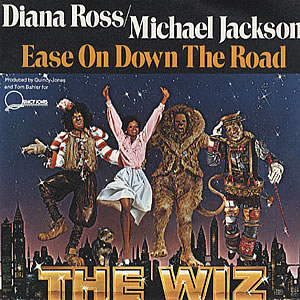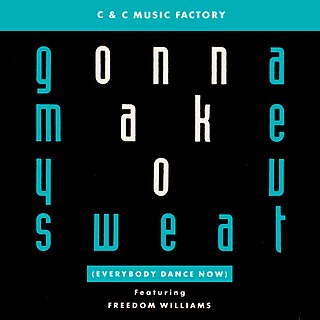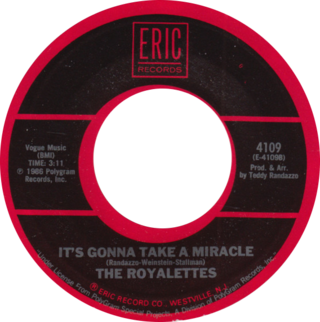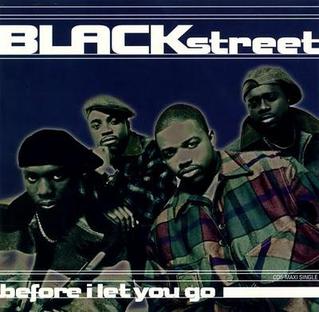New jack swing, new jack, or swingbeat is a fusion genre of the rhythms and production techniques of hip hop and dance-pop, and the urban contemporary sound of R&B. Spearheaded by producers Teddy Riley, Bernard Belle, Jimmy Jam and Terry Lewis, new jack swing was most popular from the late 1980s to early 1990s.
Guy is an American hip hop, R&B and soul group founded in 1987 by Teddy Riley, Aaron Hall, and Timmy Gatling. Hall's younger brother Damion Hall replaced Gatling after the recording of the group's self-titled debut album. The group released their debut album, which went on to sell over a million copies and was certified double platinum. In following their success, the group released their second album The Future in 1990, which also charted with successful singles and received platinum as well. Following their nearly decade long split, the group returned with their third album before the 2000s millennium, which charted with their hit single "Dancin'".
Aaron Robin Hall III is an American singer and songwriter. Hall joined the R&B and new jack swing group Guy in 1988, which was formed by Teddy Riley and Timmy Gatling, who was later replaced by Hall's brother, Damion Hall. The group's self-titled debut album (1988) was met with commercial success; Hall provided lead vocals on songs like "Groove Me," "I Like," and "Piece of My Love."

"Reach Out and Touch (Somebody's Hand)" is the debut solo single of singer Diana Ross, released in April 1970 as the first single from her solo self-titled debut 1970 album by Motown Records.

Gonna Take a Miracle is the fifth album by New York City-born singer, songwriter and pianist Laura Nyro, with assistance by vocal trio Labelle. It was released on Columbia Records in November 1971, one year after its predecessor Christmas and the Beads of Sweat. The album is Nyro's only all-covers album, and she interprets mainly 1950s and 1960s soul and R&B standards, using Labelle as a traditional back-up vocal group.

"Ease on Down the Road" is a song from the 1975 Broadway musical The Wiz, an R&B re-interpretation of L. Frank Baum's The Wonderful Wizard of Oz. The Charlie Smalls–composed tune is the show's version of both "Follow the Yellow Brick Road" and "We're Off to See the Wizard" from the 1939 version of The Wizard of Oz. In the song, performed three times during the show, Dorothy and her friends the Scarecrow, the Tin Man, and the Cowardly Lion dance their way down the Yellow Brick Road and give each other words of encouragement.

Case Woodard is an American singer, songwriter, record producer and actor. He is best known for the 1990s hits "Touch Me, Tease Me", "Happily Ever After" and "The Best Man I Can Be" with Ginuwine, R.L. and Tyrese, as well as the early 2000s hits "Missing You" and "Livin' It Up" with Ja Rule. The latter two earned him two Grammy Award nominations.

"Gonna Make You Sweat (Everybody Dance Now)" is a song by American dance music group C+C Music Factory, released by Columbia in late 1990 as the debut and lead single from their first album, Gonna Make You Sweat (1990). The song is sung by singer Martha Wash and rapper Freedom Williams. It charted internationally and achieved great success in the United States, Austria, Germany, and Sweden, where it reached number one on the charts. The music video for the song was directed by Marcus Nispel. Billboard magazine ranked "Gonna Make You Sweat (Everybody Dance Now)" among the "500 Best Pop Songs of All Time" in 2023.

"You Send Me" is a song written and originally recorded by American singer Sam Cooke, released as a single in 1957 by Keen Records. Produced by Bumps Blackwell and arranged and conducted by René Hall. The song, Cooke's debut single, was a massive commercial success, becoming a No. 1 hit on both Billboard's Rhythm & Blues Records chart and the Billboard Hot 100.
"I Believe in You and Me" is a song written by Sandy Linzer and David Wolfert in 1982. The song was first recorded and released by the R&B group The Four Tops, who released it as a single from their album One More Mountain (1982). While it failed to reach the US Top 40, it became a moderate hit for the group on the US Billboard R&B chart, peaking at number 40 in early 1983.

"Until You Come Back to Me (That's What I'm Gonna Do)" is a song written by Morris Broadnax, Clarence Paul, and Stevie Wonder. The song was originally recorded by Stevie Wonder in 1967, but his version was not released as a single and did not appear on an album until 1977's anthology Looking Back. The best-known version of this song is the 1973 release by Aretha Franklin, who had a million-selling top 10 hit on Billboard charts. The song reached No. 1 on the R&B chart and No. 3 on the Hot 100 chart in 1974. It became an RIAA Gold record.

"And I Am Telling You I'm Not Going" is a torch song from the Broadway musical Dreamgirls, with lyrics by Tom Eyen and music by Henry Krieger. In the context of the musical, "And I Am Telling You I'm Not Going" is sung by the character Effie White, a singer with the girl group The Dreams, to her manager, Curtis Taylor Jr., whose romantic and professional relationship with Effie is ending. The lyrics to "And I Am Telling You I'm Not Going", often considered the show's signature tune, describe Effie's love for Curtis, both strongly devoted and defiant. She refuses to let Curtis leave her behind, and boldly proclaims to him, "I'm staying and you ... you're gonna love me."

Alessandro Carmelo "Teddy" Randazzo was an American pop songwriter, singer, arranger and producer, who composed hit songs such as "Goin' Out of My Head", "It's Gonna Take a Miracle", "Pretty Blue Eyes", and "Hurt So Bad" in the 1960s.

"Hurt So Bad" is a song written by Teddy Randazzo, Bobby Weinstein, and Bobby Hart. It is a 1965 Top 10 hit ballad originally recorded by Little Anthony & The Imperials. Linda Ronstadt also had a Top 10 hit with her cover version in 1980. The song has been re-recorded by numerous artists including The Lettermen, who took the song to number twelve in September 1969.

"It's Gonna Take a Miracle" is a song written by Teddy Randazzo, Bobby Weinstein, and Lou Stallman. It was first an R&B hit in 1965 for The Royalettes, which reached the Top 30 on the U.S. R&B chart and peaked at number 41 on the Billboard Hot 100 and number 37 on Cash Box.
"Come On Do the Jerk" was a 1964 song recorded by R&B group the Miracles on Motown Records' Tamla label subsidiary. It was co-written by Miracles members Pete Moore, Bobby Rogers and Smokey Robinson and drummer Donald Whited. A single-only release, it did not appear on any original Miracles studio album, and was the group's last single release of 1964. Robinson and fellow Miracle Bobby Rogers were the song's producers. The flip side, "Baby Don't You Go", was also a popular regional hit but was not released on CD until The 35th Anniversary Collection in 1994. Both sides of this single received new stereo mixes for the 2002 compilation Ooo Baby Baby: The Anthology.

"Before I Let You Go" is a song by American R&B group Blackstreet, recorded for the group's self-titled debut album (1994). The song was released as the third single for the album in November 1994. The song was notable for featuring lead vocals from Dave Hollister who joined the group upon the album's release.
Robert Weinstein was an American songwriter, singer, and music industry executive, whose hit songs, mostly co-written with Teddy Randazzo, include "Goin' Out of My Head", "It's Gonna Take a Miracle" and "I'm on the Outside ".
"Give Me Just Another Day" (T54240F) is a song written by Leon Ware and released as a single in 1973 by Motown R&B group The Miracles, issued on that label's Tamla Records subsidiary. It was the first single release from the group's album, Do It Baby, which was released the following year.

"Better Use Your Head" is a song and single by American R&B group, Little Anthony & The Imperials written by Teddy Randazzo, who also produced it, and his wife Victoria Pike.














